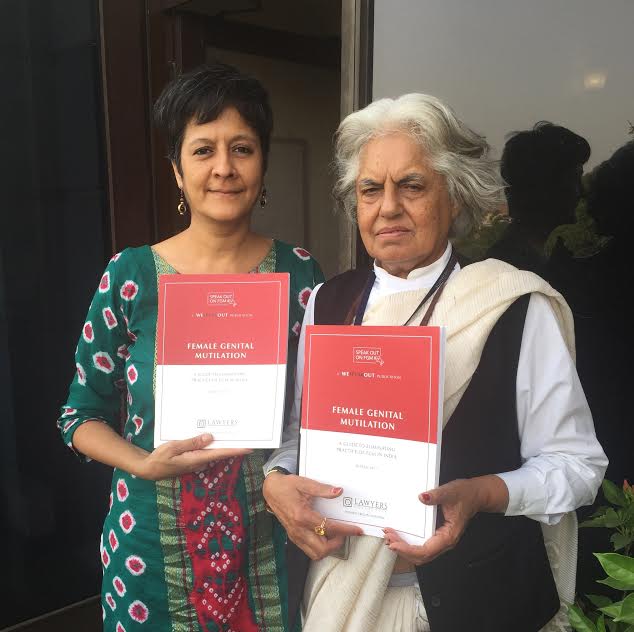
(L-R: Masooma Ranalvi and Indira Jaising release the report on FGM
A report released in Delhi yesterday highlights the physical and psychological fallout of female genital mutilation at a young age and provides a framework the Indian government could use to enact a law banning this trauma-inducing practice among Dawoodi Bohras.
The report has been compiled by Speak Out on FGM, a group of Dawoodi Bohra women survivors of “khatna” (as the practice is referred to by the priests to legitimize its practice) and the Lawyers Collective.
The report comes close on the heels of the announcement last week by the Union Minister for Women and Child Welfare, Maneka Gandhi that FGM is a criminal offence, even as per the existing provisions of the Indian Penal Code (IPC) and the Protection of Children from Sexual Offences (POSCO) Act, 2012.
The minister has called on the high priest of the community [Syedna Mufaddal Saifuddin] to take steps to end the practice, failing which the government would bring in a new law to ban it.
(“Khatna” involves cutting a part of the clitoral hood or prepuce of girls at an early age. Sahiyo, another group of Dawoodi Bohra women campaigning for an end to the practice, prefers to call it as female genital cutting (FGC). But the group Speak Out on FGM maintains that what’s called khatna is among the many definitions of FGM adopted by the World Health Organisation.
“Our report is like a blueprint on the legal aspects of the practice. While drafting a Bill on the issue, the government should find our report provides a useful framework”, said Masooma Ranalvi, convener of Speak Out on FGM.
“Our document directly speaks to the government. Now it is up to the Women and Child Development Minister to demonstrate its commitment towards the rights of women”, added senior advocate Indira Jaising of Lawyers Collective.
Ranalvi said her group along with the Lawyers Collective had spent six months taking a close look at the existing laws in the country pertaining to women and children. They also looked at the laws against FGM already in place in US, UK, Australia, France and 20 countries in Africa, including Muslim majority Egypt.
Ranalvi referred to the recent arrest of a Detroit-based physician, Dr Jumana Nagarwala and two others in connection with genital mutilation of two minor girls from the Dawoodi Bohra community.
The report provides details pertaining to rehabilitation of the victims on one hand and punitive action against parents, priests, cutters and doctors involved in the practice.
Read the full report.
Also read: Factsheet on FGM.